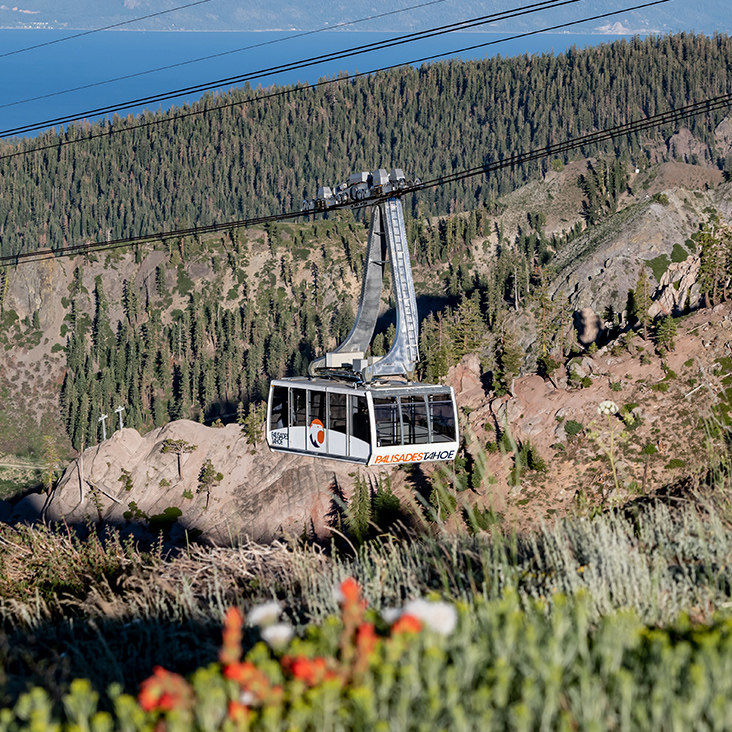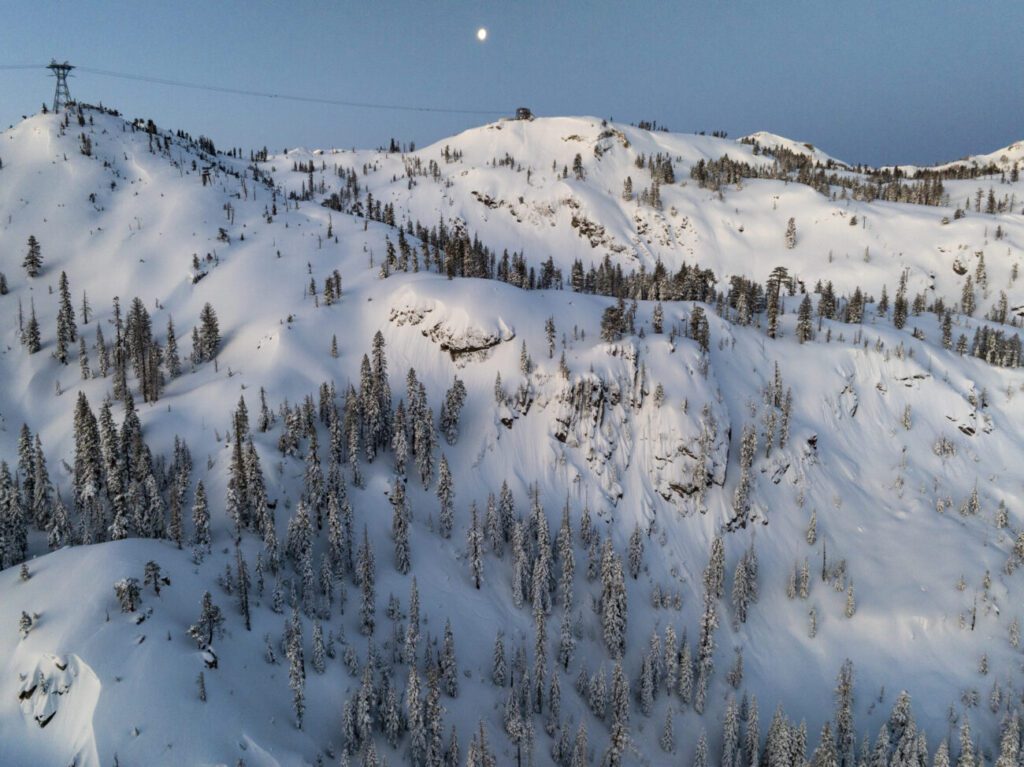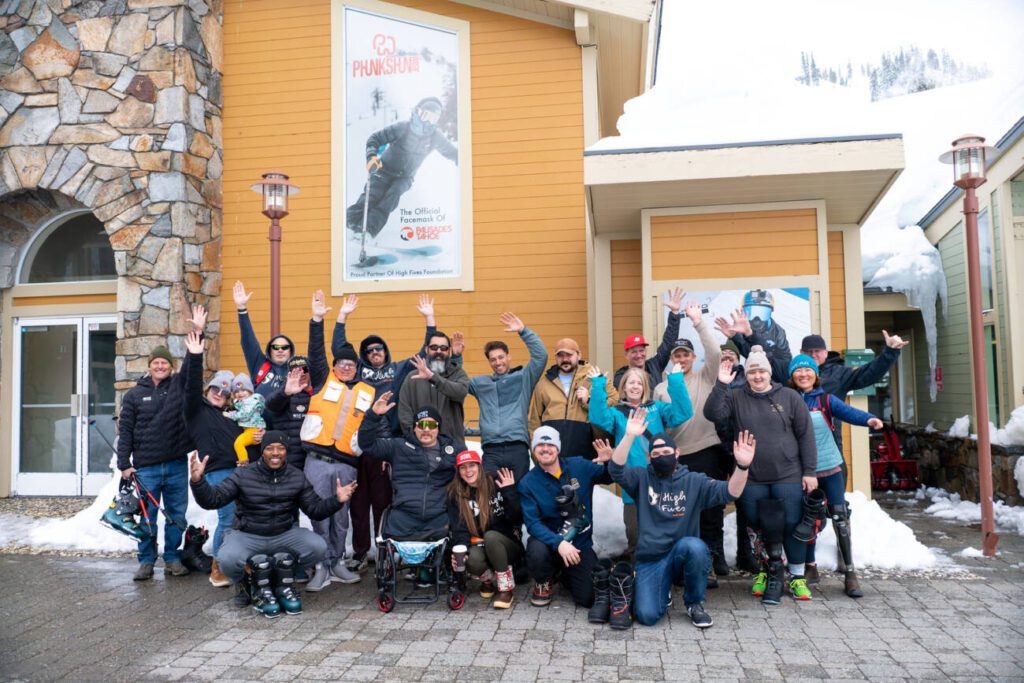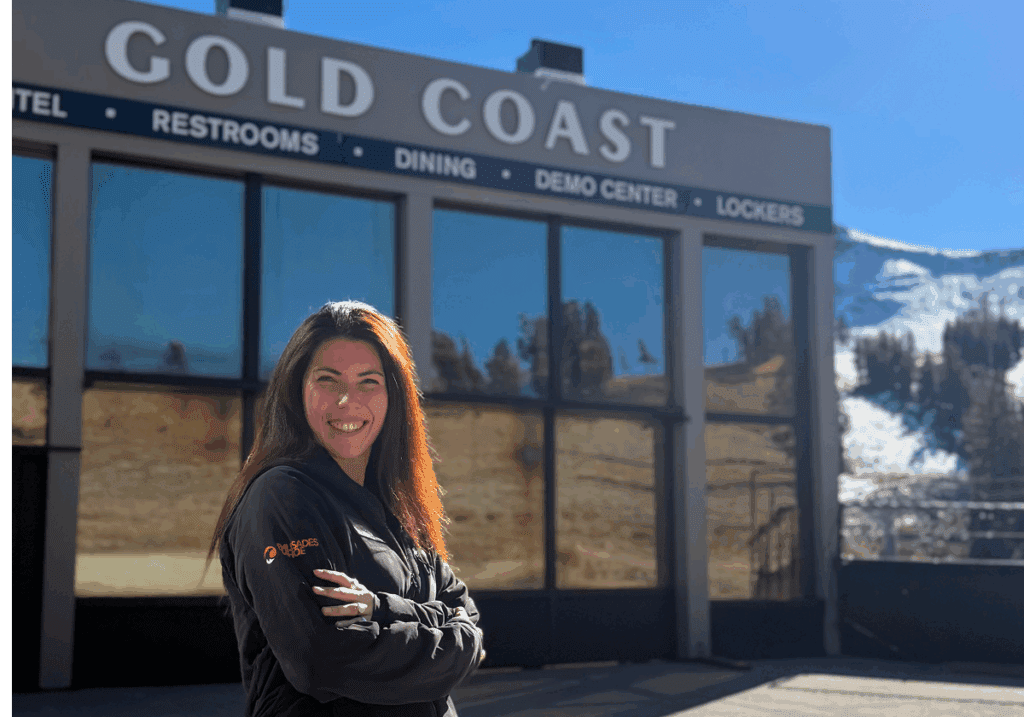If you missed PART ONE: The Washoe Tribe, please go back and read about the history, culture, and land of the Washoe Tribe for better context.
Please note that the information included in this post contains sensitive and at times graphic information. The intent is to be transparent and educational. To avoid repeating a racial slur multiple times, we will refer to our former name, Squaw Valley, as ‘Sq**w’ throughout this series.
In 2020, we made the commitment to do something that we should have done long ago: We changed our name from Sq**w Valley to Palisades Tahoe, removing a derogatory racial slur from our resort’s title. There are many rumors out there: suggestions that we are “trying to be woke” or that this change was required by our parent company, Alterra Mountain Company, but neither of these is the case. This change was the result of local people, including both employees and community members, working in tandem with the Washoe Tribe of California and Nevada to take genuine, meaningful action. We were lucky to have the support of our parent company in this daunting undertaking, but the planning and the changes happened right here in Olympic Valley.
Why is Sq**w derogatory? I thought it was just another word for a woman?
Let’s start by looking at some early examples of the use of the word sq**w. Do these sound positive or complimentary to you?
“…the crafty ‘sq**w’ … the squalid and withered person of this hag.”
James Fenimore Cooper, The Last of the Mohicans, 1826
“…the universal ‘sq**w’ – squat, angular, pig-eyed, ragged, wretched, and insect-haunted.”
Lt. James W. Steele (Memoirs, 1883)
“By way of expressing their utter contempt for him they called him a ‘sq**w’.’’
Welcker, in Tales West, 1890
Sq**w was and still is a common stereotype used in juxtaposition to the idea of the Princess. It is clearly a negative term, as shown in the following examples:
“A sq**w is a “failed” princess, “who is lower than a bad White woman”
Bird, 1999, p. 73
“The sq**w is the “darker twin” of Pocahontas and the “anti-Pocahontas.”
Valaskakis, 2005, p. 134
“Where the princess was beautiful, the sq**w was ugly, even deformed. Where the princess was virtuous, the sq**w was debased, immoral, a sexual convenience. Where the princess was proud, the sq**w lived a squalid life of servile toil, mistreated by her men—and openly available to non-Native men.”
Francis (1995, pp. 121 – 122)
The racism here is apparent as well. Not only are sq**ws thought to have “darker skin”, making them ‘less than’ compared to white women, but they are objectified and debased by white or non-Native men. This is not just a racist term, but also a sexist one. Essentially, sq**w is another word for slut or whore, but with an even deeper, more disturbing jab at skin color as well.
When Sq**w Valley was founded, did they know that this term was racist and sexist?
This is a great question and one that we get a lot in defense of the old name. “But they didn’t mean it in a racist way!” While that may be true, even good intentions can’t make up for the vile history behind the word sq**w. Let’s frame it this way: Would you be okay with a company having the n-word in its title? Would you support a company that used a swastika in its logo simply because they said they didn’t mean it in a bad way? The word sq**w is very much a representation of the genocide of Native peoples that took place, regardless of the intention.
So how did Sq**w Valley first get its name?
There are many origin stories that exist for how Sq**w Valley got its name. The primary reference for the origin story is Edward Scott’s 1960 book “Sq**w Valley.” The most commonly referenced origin story is some combination of the first and fourth below, directly referenced from the Scott book. Please note that these are all quotes and not written by the resort:
- “The legend of the faithful ‘sq**w’ waiting patiently in the valley for her warrior brave to return, not knowing he had been killed in battle with the Paiutes.”
- “One ‘Indian Charlie’ who murdered his common-law wife in the valley during a game of ‘sq**w poker.’ Unanimously acquitted [by] a jury of his fellow Washoe tribesman, after it was decided the white man’s red-eye had blinded him to what he is doing, he is said to have become known as ‘Sq**w Valley Charlie’ and left his nickname on the valley.”
- “Another source of the name is said to be the ‘Indian Sq**w’s profile’ on Sq**w Peak.”
- “A logical source of the name is based on fact. When the first emigrants moved through the valley in 1849-50 they were surprised to find only ‘sq**ws’ and children at the summer encampment. The bucks were away on a trek to Long Valley, sixteen miles to the southeast over the granite ridge from Lower Hell Hole and the Rubicon River. There they hunted the ‘picket pin’ gopher and caught grasshoppers to augment the tribe’s food supply. Since the emigrants found a majority of ‘sq**ws’ in the base camp they named it Sq**w Valley.”
- “An Olympic Valley resident brought this article to our attention when researching the history of the valley. From the 1800s, this Placer Herald article details a cold-blooded murder of an Indigenous woman as the reason the valley got its name.”
Which one of these stories is true? Let’s put them into context:
In 1850, California officially became a state. In this time period, Sq**w Valley was given its name as well. At this point, the term sq**w had already taken on a primarily dehumanizing and derogatory meaning. Upon becoming a state, California immediately enacted laws to protect and reward the kidnapping, enslavement, and sale of Native Americans. While the bounty was placed on the scalps of Native American men, white settlers quickly realized that scalps were indistinguishable, and therefore collected the scalps of women and children as well. They then received a payout for their collections, lending credibility to the Placer Herald article mentioned above.
While some believe that the most common origin story honors the legend of Native American women waiting in the valley, the idea of “honor” is contradicted by history and context. At the time the resort was named Sq**w Valley, the term sq**w had already taken on a primarily dehumanizing and derogatory context. No matter the true origin or intent of the name, we do not believe you can honor someone with a name that they clearly consider to be offensive.
Efforts Across North America To Change “Sq**w” Place Names
Across North America, numerous sites and landmarks have eliminated ‘sq**w’ and renamed their locations. At the time we changed our name, seven states had codified that it is offensive and needed to be replaced. Many more places are in the process of doing the same now that Deb Haaland, Secretary of the Department of the Interior, has motioned to ban and/or remove the name “sq**w” from usage on all federal lands. Still, we were not ahead of the curve, and the idea of changing place names did not originate in traditionally liberal states like California.
| 1995 | Minnesota | Minnesota, 1995: State law enacted to change the names of 19 geographic features with ‘sq**w’ names “to other non-derogatory names. |
| 1999-2000 | Montana | A decade-long project to remove the derogatory word ‘sq**w’ from the names of 76 streams, buttes and mountains across Montana has been completed |
| 2000 | Maine | State law enacted to change all names including the word ‘sq**w.’ |
| 2000 | Oklahoma | The word ‘sq**w’ is removed from all geographic names used in Oklahoma. |
| 2002 | Idaho | State law enacted to eventually rename all geographical place names in the state to eliminate the use of the word ‘sq**w.’ |
| 2003 | South Dakota | Offensive place names in South Dakota by county are replaced including Sq**w Lake, Sq**w Flat, Sq**w Creek, and Sq**w Hill. |
| 2003 | Oregon | Prohibition on the use of term ‘sq**w’ except as required by federal law, a public body may not use the term ‘sq**w’ in the name of public property. |
How is “Sq**w” Viewed Today?
“Sq**w” is listed and accepted as offensive, derogatory, racist, and misogynistic by the vast majority of modern sources and references. Stated differently, our name is generally accepted to include an offensive and derogatory slur.
Dictionaries Uniformly Refer to “Sq**w” as Offensive
- Oxford Language Dictionary: “Offensive”
- Dictionary.com: “Disparaging and Offensive”
- Merriam Webster: “Now, usually offensive” and “Dated, usually disparaging.”
- American Heritage Dictionary: “Offensive”
- Cambridge Dictionary: “now considered offensive by many people.”
- Collins Dictionary: “Offensive”
- Macmillan Thesaurus: “Offensive,” synonyms include “coon, colored, coolie, dago, and g*psy.”
The media generally starts from the accepted premise that “Sq**w” is a derogatory term.
- Associated Press: “derogatory term”
- Reno Gazette-Journal: “derogatory term”
- San Jose Mercury News: “derogatory term”
- LA Times: “derogatory term”
- Powder Magazine: “racial slur”
- Snowbrains: “racial slur”
- Sierra Sun: “deemed offensive”
- Fox affiliates: “derogatory term”
- Teton Gravity: “racial slur”
- USA Today: “considered offensive”
- London Telegraph: “racist slur”
What does the Washoe Tribe say?
The Washoe Tribe is constituted of approximately 2,000 people. They are governed by a Tribal Council, consisting of 12 representatives. The Council is responsible for the cultural preservation of the Washoe history and culture, and the Chair is responsible for the daily operations of the Tribe. The Tribe are landowners in Olympic Valley, where they own a large parcel adjacent to the Park.
“We have been in the area for thousands of years. Olympic Valley is within the ancestral homeland of the Washoe people. The word itself is a constant reminder of the unjust treatment of the native people, of the Washoe people. It’s a constant reminder of those time periods when it was not good for us. It’s a term that was inflicted upon us by somebody else and we don’t agree with it.”
Darrel Cruz, Washoe Tribe Historic Preservation Office
“That was a way to break us down and to devalue us and view us not as humans so we would be easier to push out.”
Serrell Smokey, Washoe Tribe Chair
What do other Native Americans say?
Tribes and members of Tribes across North America have pushed to change sq**w place names.
“The term is ‘one of four terms most offensive to Native Americans.'”
Senator Ben Nighthorse Campbell, a retired Native American United States Senator born in Auburn, California
“Yes, I’m an Indigenous woman being honored in a hotel that is named after a slur used to describe Native American women as sex objects. It was painful to bring my Native sisters here to celebrate with me. This is one of the openly racist, anti-Native American terms that people still justify the use of.”
Gabriella Cazares-Kelly, Tohono O’odham
“It’s time to change the s-word on the street to match the name of Piestewa Peak. The s-word continues to be one that is highly derogatory and of the sexual nature to American Indian women, and one that continues to be used as a negative tool, as a weapon, to make us feel less than human.”
Patti Hibbeler, Salish/Kootenai
“For me, the term is racist and derogatory. It is meant to belittle somebody or belittle their worth. Historically it has been used to [mean] prostitution as well as sexual violence against women.”
Chauma Jansen, Navajo/Sioux/Assiniboine
“Over the past month I have struggled to find an answer considering the protests against change. This river, valley and communities are the reason we choose to live here. With these shared commonalities, my unanswered question to the protest argument is this: Why do you fight so hard, to offend the Native Methow People?”
Mark Miller, Methow
We are grateful that you took the time to read this educational piece on our former name. While the reality of how offensive our former name was may be a hard truth to reckon with, it is not one that we can shy away from. We hope you will join us on our path forward as Palisades Tahoe with a better understanding of why we made the decision to move away from the use of Sq**w Valley. Tune into Part Three for a deep dive on how we arrived at the name Palisades Tahoe.
| Blog Series |
| • Part One: The Washoe Tribe |
| • Part Two: The S-Word |
| • Part Three: The Resort’s New Name |
| • Part Four: The Washoe Tribe & The Resort Today |




